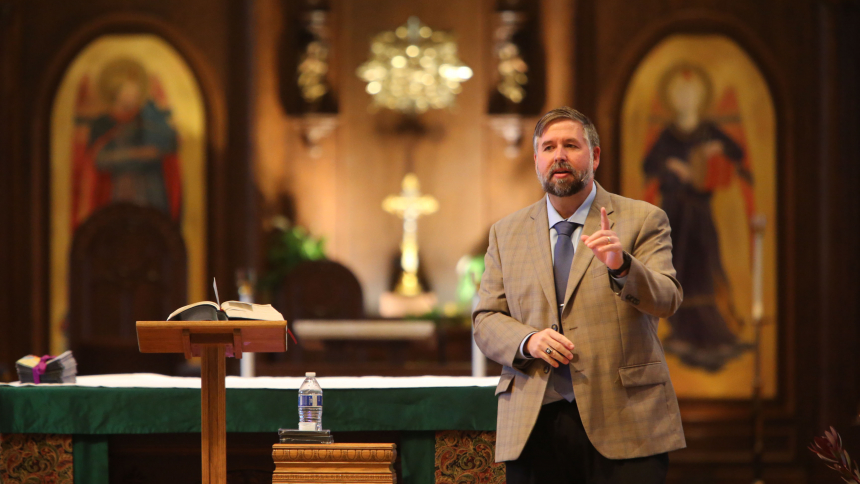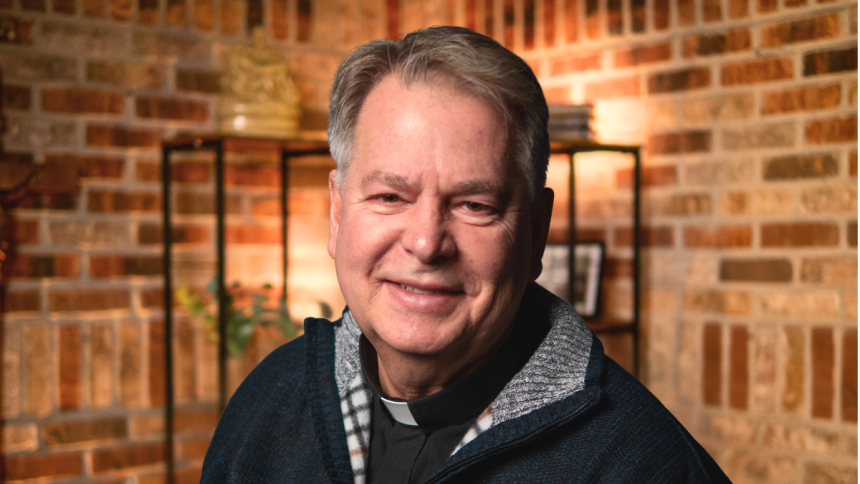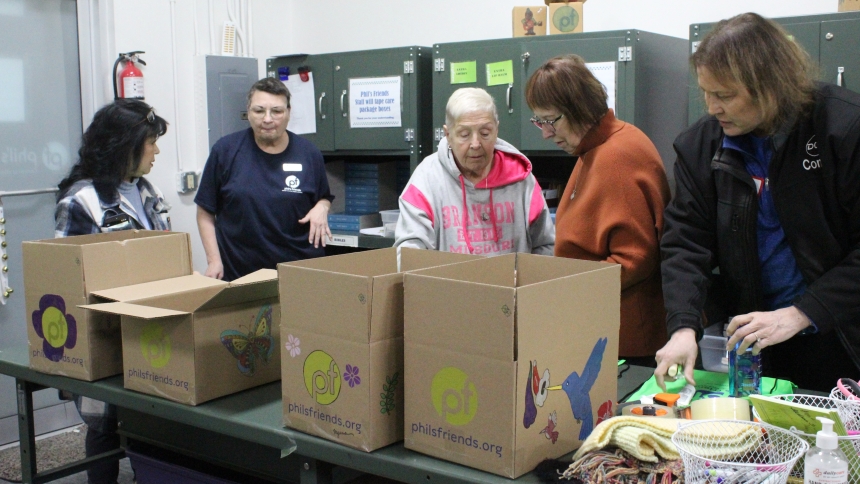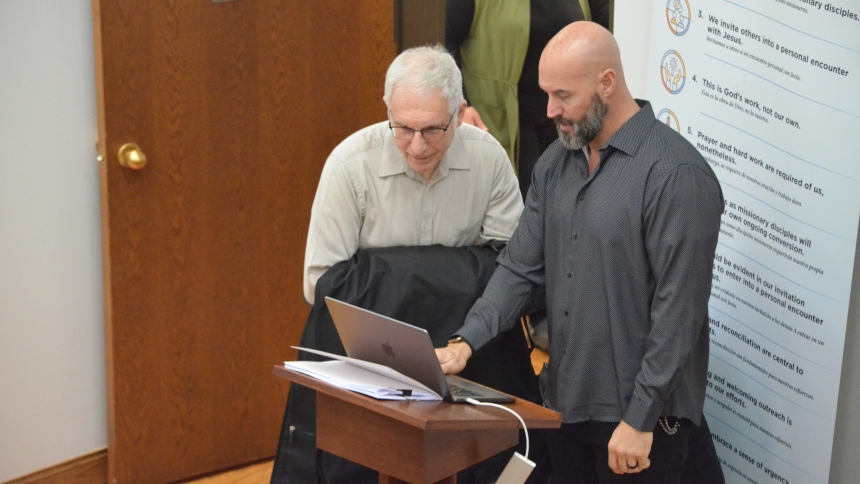
Conference helps men realize “who’s got your back”
ST. JOHN – In a time when the enemy has the world engaged in spiritual warfare, it’s important to know, “who’s got you back,” according to Deacon Harold Burke-Sivers as he addressed men attending this year’s Northwest Indiana Catholic Men’s Conference.
Nearly 150 men attended the 2021 conference held at St. John the Evangelist church on Nov. 6. Speakers for the conference included: Deacon Burke-Sivers, Chris Stewart, Paul J. Kim and Matt Loboda.
“All your brothers who are sitting here next to you. All the speakers, organizers, the bishop – we all have your back. We’re all in this together,” said Deacon Burke-Sivers. “Even Jesus needed help carrying his cross. So, what makes you think you can do this by yourself?
“We come together united in the same mission, deepening our intimacy with Christ, but we do it together as brothers,” said Deacon Burke-Sivers.
He shared how there’s been so much sadness, heaviness, and distancing from others since the COVID-19 pandemic shut things down. He reminded the men “our faith is a faith of hope. In order to recover the joy, there has to be an expectation of hope in God’s love.”
He stressed the importance of returning to church and taking time for Eucharistic Adoration.
“What we have to do to be the men God created us to be, we need to find that joy,” said Deacon Burke-Sivers. He explained the difference between happiness and joy. “Happiness and joy are not the same thing. In order to live a life of true happiness, you first have to have joy. Joy doesn’t always mean you’re going to be happy. Joy means you’re fulfilling God’s will.”
He said to put blinders on to the worldly things and “make God the priority of our lives. That’s how we find the joy that leads to happiness and peace.”
Stewart took the men on a journey into the depth of his “disturbed mind” as he reflected on the Eucharist as a source of joy. During his talk, Stewart shared four Gospel stories which “have nothing to do with the Eucharist, except in my mind.”
Stewart first referenced the “Calming of the Sea” found in Gospel of Mark, chapter four. He explained how there may be “great storms, supernatural storms” that come along, but Jesus is in the boat with us to, “provide a great calm, a supernatural calm.”
Stewart proceeded to reference Mark chapter 10, a story about a young, rich man who went away sad. “He couldn’t get rid of the finite for the infinite,” said Stewart. “We have a longing for infinite happiness but there’s only one thing that can satisfy the infinite happiness--and that’s God. We need to find it in the Eucharist.”
Stewart then navigated to John 13 and the “Washing of the Feet” and gave his take on why it replaces the Eucharistic narrative found in the three synoptic Gospels. “What I propose John does is instead of giving us the Eucharist, he gives us how to live the Eucharist.”
“The Eucharist isn’t something we simply come to at the Church and look at, or even just receive. Christianity isn’t something that simply informs us but it must transform us. It must be performed,” explained Stewart. “We do that by loving those around us. If you want your heart set on fire for the Eucharistic Lord, go out there and love the lost, the last, and the lonely. Your ability to see Christ will be the exact measure of your ability to see Christ in your spouse, children, neighbor, and the homeless person on the street corner.”
Stewart finished with the Parable of the Great Feast found in Luke chapter 14. He said so many times we think about coming to the Eucharist because He’s here physically in the church. But the real movement of the Eucharist is that He is transforming us to bring Him out there.”
Stewart explained that’s the work of evangelization. Like the Eucharist, “He’s always present. We first need to be present, be available, be open to those who know us. Be there for them like He is there for us.”
Kim admitted to not knowing much about St. Joseph, until last year. In the past year he’s come to know him as a “heavy hitter” and “a man of action, a spiritual Navy Seal who heard the command of the Lord and executed it.”
Kim explained how a recent bout of COVID-19 “rocked” him, leaving him at “one of the lowest times of my life.” He admitted, “I wish I could tell you I carried my cross the way Joseph did.”
“We all have suffering. Brothers, as long as you have a heartbeat in your chest, God still has a plan for your life. There's something only you can fulfill, even the suffering in your life takes on meaning. There is zero value in suffering if you don’t have faith. But united with Christ’s suffering, the cross takes on meaning,” said Kim.
He added, “there may be many days where we feel nothing like Joseph due to circumstances in our personal or professional lives. But the joy of the Lord is not about feelings, how good or bad your day is, it’s about aligning your will with the will of God. There, you’ll find your strength, peace, purpose, redemption you’ll find hope, when it seems like there’s no hope.”
Santos Reyes was “very happy” his son, Joshua, accepted his invitation to join him for the conference.
Joshua said the conference was a great opportunity to get “refocused. It’s been a couple of years since I've been to a conference, and I felt the need to do it. I’m glad I came.”
Santos said he invited other men from LaPorte’s Hispanic community with little success because of the language barrier. Santos remarked, “When God speaks, he speaks to different languages no matter where you are or where you come from. He speaks to you. The language is in your heart, you just have to open your heart.”
The conference also provided Deacon Barry Cummins and his two sons, Anthony and Andrew, an opportunity for father/son time. “It was an amazing time…very Christ-centered, and it spoke to our hearts.” He said Kim’s talk was a good reminder of how we need to put our faith over fear.
The Cummins boys, 16-year-old Anthony and 18-year-old Andrew were at first hesitant about attending the conference, but afterwards admitted they were glad they attended with their dad.
Anthony was impressed how Kim interacted with the men and how “he shared his struggles and how everyone struggles.”
As for Andrew and future conferences; “I’m glad we came. I’ll be back next year.”
BY BOB WELLINSKI
NWIC correspondent



